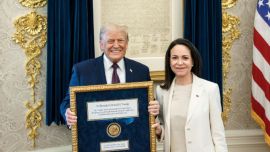THE WEEK IN CORONAVIRUS
At press time yesterday there was a total of 613,658 confirmed cases of coronavirus and 12,656 deaths, as compared to 535,705 cases and 11,148 deaths the previous Friday. Last weekend’s 204 deaths from Covid-19 included the first of Cabinet rank, former Agriculture minister Carlos Casamiquela (72), the last farming overseer of the Kirchner presidencies (2013-2015). During the week quarantine continued much as it has done for the last six months as from tomorrow but at an increasingly high level with confirmed cases moving into five digits and 345 deaths on Thursday alone. Consultations over the next phase of quarantine due to begin along with spring on Monday were affected by the tension over the transfer of federal revenue-sharing funds from Buenos Aires City to Province with talks delegated to the respective Cabinet Chiefs Felipe Miguel and Carlos Bianco but the anti-pandemic triumvirate of President Alberto Fernández, City Mayor Horacio Rodríguez Larreta and Buenos Aires Governor Axel Kicillof was finally renewed on Thursday when the security cameras at ex-president Mauricio Macri’s home were reportedly investigated for possible quarantine violation in the form of a September 10 meeting with three mayors.
MARKETS – BLUE DOLLAR SOARS
Markets were hit last week by worse turbulence than in any of the 15 weeks of default (ended earlier this month) as from Tuesday when the Central Bank announced drastic measures to protect dwindling reserves, totally overshadowing the submission of the 2021 budget to Congress the same day. A 35 percent surcharge was slapped on the 30 percent PAIS tax already levied on monthly dollar purchases capped at US$200 in the hope of bringing them within range of parallel exchange rates and thus limiting the drainage on Central Bank reserves. To these restrictions on millions of small savers were added new capital controls for companies, obliging all owing over US$ one million of capital debt to refinance 60 percent with only 40 percent payable with dollars purchased from the Central Bank, as well as restricting the use of share transactions to obtain foreign exchange. The immediate reaction of the parallel “blue” dollar was to soar from 131 to 145 pesos although it closed the week in the 140-141 range while the official exchange rate at Banco Nación inched up to 79.25 pesos per dollar yesterday from 78.75 pesos the previous Friday with the significant difference that in future an extra 65 percent must be paid, not 30 percent. Country risk, which closed last week at just over 1,100 points, shot up to 1,182 points in the immediate wake of the Central Bank moves, reaching 1,237 points yesterday.
EXODUS?
The “exodus” of foreign companies from Argentina during lockdown (a list headed by Latam Airlines and Walmart) gathered steam last week, starting on Monday with Chile’s Falabella and followed on Wednesday by the Spanish delivery firm Glovo. In the latter case the withdrawal was from the entire Latin American region, selling its operations to Berlin-based Delivery Hero – the majority shareholders in PedidosYa (of Uruguayan origin) since 2014 – for 230 million euros with PedidosYa taking charge of activities here.
INFLATION AT 2.7%
Last month’s inflation was 2.7 percent with 18.9 percent for the year so far and 40.7 percent over the last 12 months, INDEC statistics bureau reported on Wednesday. The key item of food and beverages registered the most acceleration along with domestic appliances, both 3.5 percent.
BUDGET BILL
The 2021 budget was submitted to Congress on the traditional date of September 15 last Tuesday although this passed almost unnoticed due to the Central Bank crackdown on dollar purchases the same day. The budget forecasts 5.5 percent growth for next year, a fiscal deficit of 4.5 percent of Gross Domestic Product, 29 percent inflation and an official exchange rate of 102.40 pesos per dollar by the end of 2021. Other forecasts included an investment rate of 18.1 percent and a lower trade surplus due to imports increasing 16.3 percent as against 10.2 percent export growth. Economy Minister Martín Guzmán is due to explain further details in Congress next week.
CONGRESSIONAL CONTROVERSY
The Senate voted on Wednesday to quash the 2016 decrees transferring three judges – Leopoldo Bruglia, Pablo Bertuzzi and Germán Castelli – to their current benches from where they participate in the investigation of Vice-President Cristina Fernández de Kirchner in corruption cases. The removal of the judges (who must now return to their previous benches already occupied) was approved by 41 of the 72 senators with the Juntos por el Cambio opposition staging a walkout (figuratively speaking since the session was virtual in line with pandemic quarantine restrictions). The following day President Alberto Fernández signed decrees on Thursday to formalise the vote. Bruglia and Bertuzzi had previously requested the "immediate intervention" of the Supreme Court to halt the Senate session but the Court had responded that it could not rule on an issue ahead of the event – now that their removal is a reality, it remains to be seen how the Supreme Court reacts. On Thursday the President sent the Senate a bill to overturn all the federal revenue-sharing increases granted the City by the Mauricio Macri administration in 2016 to fund the transfer of the Federal Police, almost doubling the cuts made earlier this month.
NEW IDB CHIEF
Having resisted a United States presidency of the Inter-American Development Bank (IDB, or BID in its Spanish acronym) until just before last weekend’s vote, President Alberto Fernández briefly rang BID president-elect Mauricio Claver-Carone upon his victory, it was revealed last Tuesday. The latter received the vote of 30 countries with Argentina among five Latin American countries plus the European Union to abstain. Just before last weekend Argentina withdrew the candidacy of Strategic Affairs Secretary Gustavo Beliz (who has worked almost 15 years at BID earlier this century), thus leaving Claver-Carone, a hardliner against Venezuela, unopposed to become the first North American president in the six decades of BID history. Previously Argentina had sought to postpone the vote until March in the hope that a change of government in Washington would deprive Claver-Carone of US support.
REST IN PEACE
Apart from former Agriculture Minister Carlos Casamiquela (see coronavirus news above), some well-known names died last week – Mario Cafiero (64), the head of the Inaes institute for co-operatives, last weekend, constitutional law expert Gregorio Badeni (77) last Monday and Italian-born fashion designer Elsa Serrano (73) on Wednesday night from a fire in her downtown flat where she lived in isolation as belonging to a coronavirus risk group. Ironically enough, Cafiero was mentioned more than once on the day he died by his nephew, Cabinet Chief Santiago Cafiero, in the Jorge Fontevecchia interview published in this newspaper last Saturday.



















Comments